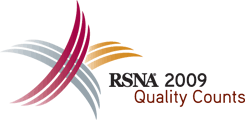
Abstract Archives of the RSNA, 2009
SSA05-02
A Study of the Utility of Revised Trauma Scores and Glasgow Coma Scale in the Triage and Selection of Patients for Urgent Computed Tomography Scanning in the Setting of Acute Trauma
Scientific Papers
Presented on November 29, 2009
Presented as part of SSA05: Emergency Radiology (Thoracoabdominal Trauma)
Cressida Brennan, Presenter: Nothing to Disclose
Joseph Coyle, Abstract Co-Author: Nothing to Disclose
Kevin Noel O'Regan MD, Abstract Co-Author: Nothing to Disclose
Patrick Mc Laughlin MBBCh, Abstract Co-Author: Nothing to Disclose
Max Frederick Ryan MBBCh, Abstract Co-Author: Nothing to Disclose
Michael M. Maher MD, FRCR, Abstract Co-Author: Nothing to Disclose
To determine the diagnostic utility of the Revised Trauma Score in the prediction of positive findings on cranial, spinal, thoracic or abdominal computed tomography in trauma patients.
We retrospectively reviewed the trauma registry in the Emergency Department of our level 1 trauma centre. We identified all patients who presented over a six month period with all cause traumatic injuries. All patients had documented systolic blood pressure, pulse rate, respiratory rate and GCS level.
From this group, we sub-selected all those who underwent Computed Tomography. The imaging of these patients was reviewed in conjunction with the calculated GCS and Revised Trauma Scores on presentation to the accident and emergency department.
In total 260 patients were identified as presenting with acute trauma. 121 of these underwent CT. 98 of these patients were male, 23 were female. The Mean Age of patients included was 37.1, Range 5m-90yrs.
Indications for CT included; Head Injury (n=43, 35%); RTA (n=31, 26%); Fall (n=15, 12%); Assault (n=11, 9%).
Documented GCS Ranged from 3-15; Mean 12.6; 44.6% (n=54) had GCS <15.
Of the patients with GCS<15, 70% (n=38) had positive findings on CT.
Of the patients with normal GCS score, 58% (n=39) had positive findings on CT.
The calculated revised trauma scores (RTS) for each patient ranged from 7-12; Mean 11.3;
Patients with RTS of 12 (70%, n=85), 42% (n=36) had normal CT findings, 58% (n=49) had positive CT findings. Patients with RTS < 12 (30%, n=36), 22% (n=8) had normal CT findings, 78% (n=28) had positive CT findings.
Patients with Normal CT findings had a mean GCS 14. The mean RTS of patients with a normal CT was 11.7. Of the patients with positive CT findings, the mean GCS was 11.79 and the mean RTS was 11.1.
• A GCS of 15 or RTS of 12 are not reliable indicators for negative CT findings in acute trauma patients. 58% of pts with GCS15 and 58% of pts with RTS12 had positive scan findings on CT.
• Patients with RTS<12 had positive scan findings in 78% of cases.
• Positive scan findings were associated with lower GCS scores (Mean GCS 11.8 v 14.0) but not with significantly lower RTS scores (Mean RTS 11.7 v 11.1).
This study explores the clinical application and relevance of a calculated revised trauma score in predicting positive computed tomography in patients presenting following all cause trauma.
Brennan, C,
Coyle, J,
O'Regan, K,
Mc Laughlin, P,
Ryan, M,
Maher, M,
A Study of the Utility of Revised Trauma Scores and Glasgow Coma Scale in the Triage and Selection of Patients for Urgent Computed Tomography Scanning in the Setting of Acute Trauma. Radiological Society of North America 2009 Scientific Assembly and Annual Meeting, November 29 - December 4, 2009 ,Chicago IL.
http://archive.rsna.org/2009/8014714.html

